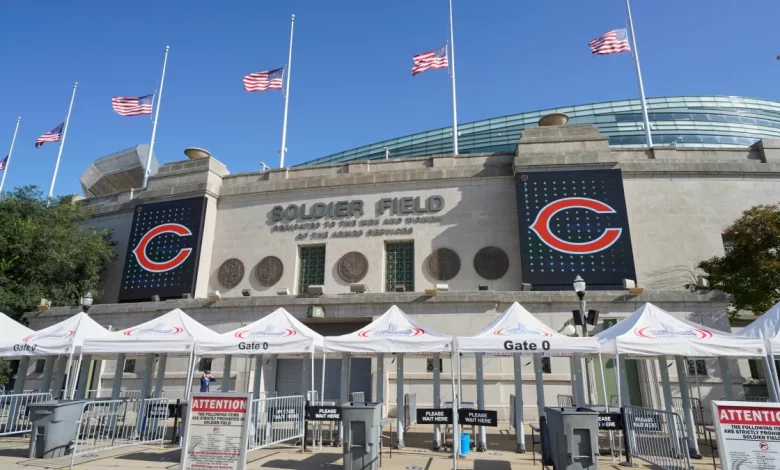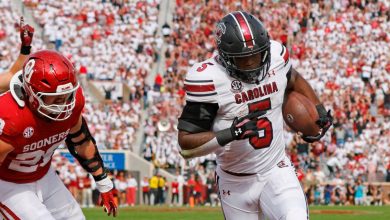Greg Hinz talks about the McCaskeys’ upcoming financial plans, with an emphasis on possible investments, stadium improvements, and managing future team valuations.

Greg Hinz, a veteran journalist known for his insights into the intersection of business and sports in Chicago, recently explored the financial outlook for the McCaskey family, owners of the Chicago Bears. As the franchise enters a new phase of leadership, with Virginia McCaskey, the longtime matriarch, gradually stepping back, the future of the Bears is at a critical juncture. With a combination of potential investments, necessary stadium improvements, and the growing importance of managing future team valuations, the McCaskeys face decisions that will shape the team’s long-term financial success.
The Changing Landscape of the NFL
The NFL’s financial landscape has changed drastically over the past decade. Television deals, media rights, and the explosive growth of sports betting have all contributed to the growing revenue streams within the league. The Bears, as one of the NFL’s most storied franchises, have seen this growth reflected in their revenue. However, this influx of money is paired with increasing expenses. Salaries for players, coaches, and staff continue to climb, while other financial obligations, such as stadium maintenance and upgrades, place significant pressure on the organization.
As the McCaskeys prepare to chart their financial course for the future, they must navigate these trends while positioning the Bears to compete with other NFL teams that are also ramping up their financial investments. The league’s growing revenue has raised the stakes, with teams vying not only for championships but also for long-term profitability. For the McCaskeys, who have already been through multiple eras of success and struggle with the Bears, it’s crucial to make smart financial decisions that preserve the team’s value while maximizing its potential.
Investments: Building for the Future
For the McCaskeys, investing in the future of the Bears is essential. Several avenues for investment stand out as critical for their long-term success: infrastructure improvements, player development, and marketing initiatives that engage a new generation of fans.
One of the most obvious areas for investment is the team’s facilities. The Bears currently play at Soldier Field, one of the oldest stadiums in the NFL, which has long been a point of contention among ownership, players, and fans. While Soldier Field is iconic and rooted in the team’s history, it’s widely acknowledged that the venue is no longer ideal for a modern NFL team. The stadium’s aging infrastructure, limited seating capacity, and lack of modern amenities place the Bears at a disadvantage compared to teams with newer, more state-of-the-art facilities.
In the past few years, discussions about moving to a new stadium have gained traction, especially as the McCaskeys explore possible alternatives in the Chicago area. One potential site is the suburb of Arlington Heights, where the Bears purchased a significant plot of land in 2021. The plans for a new stadium complex in Arlington Heights could provide the Bears with the opportunity to build a state-of-the-art venue that includes not just a new stadium but also entertainment options, retail spaces, and hotels — all aimed at generating additional revenue streams for the team. This investment in real estate is not just about the stadium itself but also about creating a destination that attracts fans year-round.
Additionally, building a new stadium would allow the Bears to take advantage of more lucrative revenue-sharing opportunities that have become standard in the NFL. Modern stadiums are designed not just to host games but also to serve as hubs for entertainment, with facilities capable of hosting concerts, large-scale events, and corporate functions. Such investments would not only increase the Bears’ annual revenue but could also help the team stay competitive in a league where stadium revenues are an increasingly important factor.
Beyond infrastructure, investing in player development is another key priority. As the NFL becomes more competitive, having a solid pipeline of talent is crucial. The Bears have faced challenges in recent years regarding their roster, with inconsistent performance on the field. To address this, the McCaskeys will need to prioritize investment in scouting, coaching, and player development programs. The McCaskey family has traditionally been hands-off with day-to-day team management, but they will likely need to allocate more financial resources toward ensuring that the Bears have the right leadership and talent to succeed in the years to come.
Stadium Improvements: Soldier Field vs. Arlington Heights
The most pressing decision facing the McCaskeys’ financial strategy is the future of Soldier Field. The venue, located on the shores of Lake Michigan, is part of the city’s architectural and sports history, but it’s also facing a significant number of challenges. The stadium’s age and its location — within the city limits, where expansion is constrained — make it difficult to provide the amenities that modern NFL fans expect. Furthermore, Soldier Field’s relatively small capacity compared to newer NFL stadiums makes it less competitive in terms of revenue generation.
The Bears’ purchase of the Arlington Heights property raised the stakes in this debate. The team is reportedly considering a massive redevelopment project that could transform the suburban location into a football-and-entertainment complex, much like other major NFL franchises have done in their respective cities. This move would not only give the Bears a chance to build a state-of-the-art stadium but also provide ample opportunities for additional revenue streams, including retail, dining, and hospitality services.
However, the decision to move out of Soldier Field is not without complications. The Bears’ lease with the city of Chicago runs through 2033, and breaking that lease could result in significant legal and financial consequences. Additionally, the McCaskeys would face opposition from Chicago politicians and citizens who value the historic nature of Soldier Field. Yet, the potential benefits of a modern stadium could outweigh these challenges. The McCaskeys have long been committed to preserving the team’s connection to the city, but their financial strategy must also account for the changing needs of both the team and its fanbase.
Managing Future Team Valuations
As one of the most recognized franchises in the NFL, the Chicago Bears hold significant financial value, but the team’s valuation could shift dramatically depending on the McCaskeys’ decisions in the coming years. NFL teams have experienced explosive increases in their valuations in recent years, thanks to lucrative television deals, expanding global reach, and growing interest in sports betting. However, with such growth comes increased expectations. Fans expect their teams to be competitive, and the McCaskeys will need to balance financial investments with on-field success to ensure that the Bears’ valuation continues to rise.
The McCaskeys will need to consider both short- and long-term strategies to protect the Bears’ financial health. For instance, while investing in a new stadium and the surrounding area might take years to fully realize its financial returns, the McCaskeys must ensure that the team remains competitive on the field in the interim. This means making key investments in the scouting department, front-office leadership, and player development systems to ensure that the Bears are not only building a strong financial foundation but also an on-field product that can contend for championships.
The valuation of NFL teams is also influenced by ownership structure and management. As the McCaskeys age, questions about the future of the franchise have emerged. Will the McCaskeys maintain control, or will ownership pass to another family member or a new group of investors? This question is particularly pertinent as the Bears are likely one of the most sought-after franchises in the NFL, and there is a growing trend of outside investors seeking a stake in NFL teams. The McCaskeys will need to navigate this shifting landscape carefully, making strategic financial decisions that ensure the Bears remain an asset while preserving the family’s legacy.









